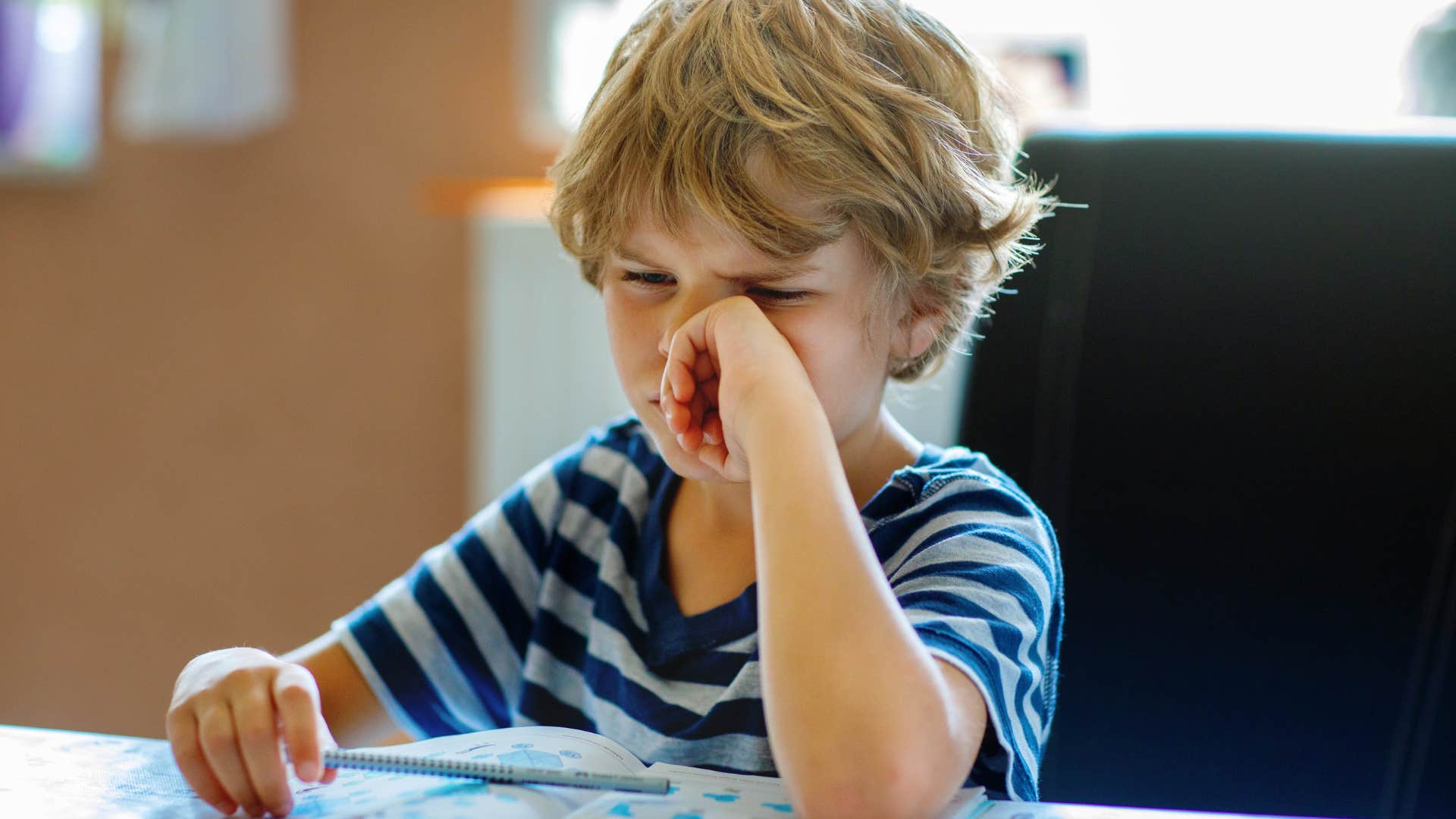11 Things Kids Raised By Gentle Parents Do That Everyone Else Finds Disrespectful
Authentic gentle parenting can be difficult and exhausting to maintain.
 Alexandr Grant / Shutterstock
Alexandr Grant / Shutterstock Popularized online by new generations of parents seeking to unlearn mental health stigmas and disciplinarian parenting styles, “gentle parenting” techniques revolve around three main things: parental emotional regulation, teaching kids self-awareness and self-regulation, and a balance of physical and emotional affection. By offering up space for children to practice emotional intelligence, rather than shutting it down in favor of entirely transactional or authoritarian parenting styles, the hope is that kids turn out regulated, happy, and healthy.
However, according to experts like psychology professor Annie Pezalla, many gentle parents are experiencing burnout attempting to follow through with this sometimes perfection-oriented parenting style. Many of the things kids raised by gentle parents do that everyone else finds disrespectful aren’t necessarily a result of ineffective techniques, but rather the vague boundaries, exhaustion, and confusion their parents struggle with on a daily basis.
Here are 11 things kids raised by gentle parents do that everyone else finds disrespectful
1. Questioning authority
 MAYA LAB | Shutterstock.com
MAYA LAB | Shutterstock.com
Rather than pushing beliefs about respecting elders and seeing parents as bosses of their children, many gentle parenting experts encourage teaching kids to look inward for guidance. Some experts even suggest that gentle parents stress reliance on emotions instead of authority, trying to craft a balanced relationship outside of power hierarchies with their kids, instead of acting like their parents.
As they get older, questioning authority is one of the things kids raised by gentle parents do that everyone else finds disrespectful, whether it’s in the professional world, in school, or with older family members. Many of these kids simply question things because their parents, who encouraged them to think critically, celebrated their curiosity and expression without many regulations.
2. Throwing tantrums
 PR Image Factory | Shutterstock.com
PR Image Factory | Shutterstock.com
When parents punish their kids for expressing emotions, they teach them to view vulnerability and expression as inherently bad things, as a study published in the Psychological Inquiry journal argues. That’s why gentle parents tend to allow their children to feel things in whatever way they want, even if they diverge from societal norms or their own personal emotional techniques, like throwing a tantrum in the grocery store.
Of course, when left unrestricted, this gentle parenting behavior can also be unhelpful for children as they get older, as they may not understand how to regulate their complex emotions depending on the situation or environment they’re in. No matter what, discipline is still important, but some gentle parents forget or avoid acknowledging that.
No parent should demonize their children’s emotions; instead, they should teach them to regulate those big feelings, so they’re not overflowing with things like anger or frustration in uncomfortable settings.
3. Saying no often
 Fizkes | Shutterstock.com
Fizkes | Shutterstock.com
Many parents, especially those with authoritarian styles with their children, expect kids to blindly follow their rules, be agreeable, and suppress their own needs in favor of their demands. However, gentle parents aim to do the opposite. They not only remove themselves from authority identities at home, but they also empower their kids to set boundaries, express their needs, and say no.
Even if it’s something as simple as saying no to a hug from a family member, these are some of the things kids raised by gentle parents do that everyone else finds disrespectful, especially people who feel entitled to your space and time.
4. Not making eye contact
 Fizkes | Shutterstock.com
Fizkes | Shutterstock.com
While social anxiety is generally associated with low emotional intelligence, according to a study published in Innovations in Clinical Neuroscience, sometimes gentle parents with good intentions encourage their kids to lean into “protecting their peace” over formalities and basic manners. They may avoid eye contact or even entire conversations because they feel uncomfortable, because their parents have empowered them to set boundaries that aren’t always entirely well-rounded and productive.
Many of the things kids raised by gentle parents do that everyone else finds disrespectful often stem from parents burning out or lacking the tools to promote healthy behaviors in their kids. They have the best intentions in empowering their kids to set healthy boundaries, advocate for themselves, and protect their emotional security, but sometimes lack the tools, strategies, and language to do so.
5. Putting their own needs first always
 MAYA LAB | Shutterstock.com
MAYA LAB | Shutterstock.com
Parents have a responsibility to teach their kids the difference between two distinct experiences. According to psychologist Becky Kennedy, the message should be: "You are the center of my world, but not the center of the world."
It’s important to advocate for yourself, but many gentle parents overindulge this idea in their children, pushing them to put their needs before anyone else’s. They lean so heavily into empathy in the parent-child relationship that they sometimes forget to teach their kids the importance of offering it to others. That’s why entitlement and putting their own needs first are some of the things kids raised by gentle parents do that everyone else finds disrespectful.
As clinical psychologist Emily Edlynn argues, you can have connection and consequences at home and still be a great, healthy, and productive parent. Just because you’re adopting the great values associated with gentle parenting, like using empathy and establishing warmth at home, doesn’t mean you have to overlook the benefits of parental boundaries, discipline, and perspective.
6. Talking back
 Fizkes | Shutterstock.com
Fizkes | Shutterstock.com
According to a study published in Frontiers in Psychology, children who grow up with warm, yet disciplinary, parents, usually with authoritative parenting styles, often boast higher levels of empathy and fewer aggressive behaviors than those with gentle or permissive parents. They’re blunt, express their emotions at any time or place, and tend to expect other people to treat them with the same permissiveness or attention that their parents do.
That’s why talking back is often one of the things kids raised by gentle parents do that everyone else finds disrespectful. They believe that the world will conform to their needs, desires, and emotions, when in reality, most people are more focused on their own.
7. Not saying ‘please’ and ‘thank you’
 Irina WS | Shutterstock.com
Irina WS | Shutterstock.com
Considering many parents are hyper-focused on teaching emotional regulation and expression, often to the point of burnout and exhaustion themselves, they sometimes miss the importance of basic social norms like manners. Whether it’s saying “please” and “thank you” or apologizing to others, these can be some of the things kids raised by gentle parents forget to do that everyone else finds disrespectful.
While internal self-regulation is incredibly important, a parent plays just as much of a role in their children’s adoption of societal norms and behaviors, as well.
8. Struggling to accept no as an answer
 AstroStar | Shutterstock.com
AstroStar | Shutterstock.com
Despite learning to set their own boundaries and constantly having conversations about the importance of self-advocacy from their gentle parents, many children from these households may struggle with accepting no as an answer from others.
They may overstep boundaries with others and prioritize their own needs, as they’ve either experienced gentle boundaries with their parents or struggled to regulate in response to strict refusals at home. While non-coercive and gentle parenting may offer an element of independence to kids, it may simultaneously set them up to struggle with external defiance and constraints.
9. Avoiding confrontation and conflict
 Nomad_Soul | Shutterstock.com
Nomad_Soul | Shutterstock.com
While parental warmth is a significant indicator for childhood well-being and growth later in life, some kids with gentle parents who are overly responsive and accommodating may struggle with practicing conflict-resolution and regulation under duress.
Their parents aren’t arguing or fighting with them at home, which in some ways increases prosocial behavior and empathy. Still, they can also ensure they’re unequipped for inevitable confrontation in other aspects of their lives. Whether it’s avoiding these conversations or embracing them with an entitled mindset, these are some of the things kids raised by gentle parents do that everyone else finds disrespectful and unsettling.
10. Interrupting others
 DC Studio | Shutterstock.com
DC Studio | Shutterstock.com
According to a study published in the Family Relationship journal, parents with indulgent styles at home tend to promote less self-control and self-efficacy in their kids. So, it’s not surprising that behaviors like interrupting others in conversations or refusing to follow directions —both examples of lacking self-control —are among the things kids raised by gentle parents do that others find disrespectful.
Of course, teaching kids self-control strategies and mentalities isn’t just helpful for following social norms and making better connections early in life. It can also significantly reduce their chances of misbehavior, unhealthy vices, and isolation later in life.
11. Shouting or demanding things
 Brian A Jackson | Shutterstock.com
Brian A Jackson | Shutterstock.com
Similarly to interrupting people in conversations or having tantrums in public, the sometimes-permissive and indulgent parenting styles of gentle parents can encourage kids to lack self-control and regulation in the face of uncertain external circumstances.
They may shout and demand things from others, a habit that other people, especially those in older generations, find incredibly disrespectful in public and shared spaces. At home, they may be more regulated with the perfect blend of comfort, security, and leniency from their parents, but in public, it’s an entirely different situation.
Zayda Slabbekoorn is a staff writer with a bachelor’s degree in social relations & policy and gender studies who focuses on psychology, relationships, self-help, and human interest stories.

